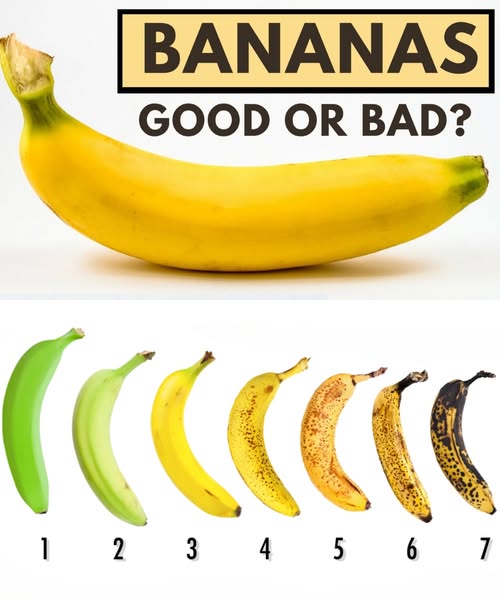Introduction

Bananas are one of the most popular fruits worldwide, loved for their natural sweetness, portability, and impressive nutritional profile. From athletes who rely on them for quick energy to health-conscious eaters who enjoy them in smoothies, bananas are everywhere. Yet, a common question remains: are bananas good or bad for you?
The answer isn’t as simple as “yes” or “no.” In fact, bananas can be either a health booster or a hidden culprit—depending on how you eat them, when you eat them, and what you eat them with.
In this blog, we’ll dive deep into the science-backed facts about bananas, uncover the pros and cons, and answer the most frequently asked questions about this everyday fruit. By the end, you’ll know exactly how to enjoy bananas to maximize their benefits while avoiding potential downsides.
Why Bananas Are Often Considered Healthy
Bananas are rich in essential nutrients and provide a range of health benefits. Here’s a quick look at what makes them a favorite in the nutrition world:
- Nutrient Powerhouse
- A medium banana contains:
- 105 calories
- 27g carbohydrates
- 3g fiber
- 1.3g protein
- 422mg potassium (12% of your daily needs)
- 17% of daily vitamin C needs
- 20% of daily vitamin B6 needs
- Bananas are naturally free of fat, cholesterol, and sodium.
- A medium banana contains:
- Excellent Source of Potassium
- Potassium is vital for heart health, muscle function, and regulating blood pressure.
- Studies suggest that diets rich in potassium can reduce the risk of stroke by up to 27%.
- Supports Digestion
- The soluble fiber in bananas helps regulate digestion and promotes a healthy gut.
- Green (unripe) bananas are especially rich in resistant starch, which feeds good gut bacteria.
- Quick Energy Boost
- With easily digestible carbs, bananas provide rapid energy—ideal for athletes or anyone needing a pre-workout snack.
The Downsides of Bananas: Why They’re Not Always “Good”
While bananas offer many benefits, there are potential drawbacks depending on how they’re consumed.
- High in Sugar and Carbs
- A ripe banana contains about 14g of sugar. For individuals with diabetes or insulin resistance, this spike can affect blood sugar control.
- Overeating Bananas Can Backfire
- Eating multiple bananas daily may lead to excessive sugar and calorie intake, which could hinder weight loss goals.
- Not Ideal for Low-Carb Diets
- Keto or low-carb followers may find bananas unsuitable since one banana has more carbs than their daily allowance.
- Digestive Issues for Some
- People with sensitive stomachs may experience bloating or discomfort from excess fiber or resistant starch.
Are Bananas Good or Bad for Weight Loss?
This is one of the most frequently asked questions.
- Good for Weight Loss:
- High fiber helps you stay full longer.
- Can replace unhealthy snacks like cookies or chips.
- Bad for Weight Loss:
- If consumed in excess, the sugar content may contribute to calorie overload.
- Best consumed in moderation (1 banana per day).
Pro tip: Pair bananas with protein (like peanut butter or Greek yogurt) to balance blood sugar and increase satiety.
Bananas and Blood Sugar: Should Diabetics Eat Them?
Bananas have a medium glycemic index (GI) of around 51, meaning they cause a moderate rise in blood sugar.
- Good for Diabetics:
- Unripe bananas have more resistant starch, which slows sugar absorption.
- Fiber content reduces sugar spikes.
- Bad for Diabetics:
- Overripe bananas can raise blood sugar quickly.
- Eating bananas alone may cause glucose fluctuations.
Solution: Diabetics should opt for small or slightly green bananas and pair them with protein or healthy fats.
Bananas for Athletes: A Natural Performance Enhancer
Bananas have long been the go-to snack for athletes.
- Provide quick, easily digestible energy.
- Reduce muscle cramps due to potassium and magnesium.
- Studies show bananas are as effective as sports drinks in sustaining endurance performance.
Tip: Eat one banana 30 minutes before a workout for an energy boost.
FAQs About Bananas
1. How many bananas should I eat per day?
Most experts recommend 1–2 bananas per day for a balanced diet.
2. Are bananas fattening?
No, bananas themselves are not fattening. Excessive calorie intake from any food, including bananas, can lead to weight gain.
3. Are bananas good for your heart?
Yes! Potassium in bananas helps lower blood pressure and reduce cardiovascular risk.
4. Should I avoid bananas if I’m on a low-carb diet?
Yes. One medium banana contains about 27g of carbs—too high for strict low-carb or keto plans.
5. Do bananas cause constipation?
Unripe bananas can relieve diarrhea, while ripe bananas may sometimes worsen constipation due to lower resistant starch.
6. Can bananas help you sleep?
Yes, bananas contain tryptophan, magnesium, and vitamin B6, which help produce serotonin and melatonin—promoting relaxation and better sleep.
How to Eat Bananas the “Right Way”
To maximize benefits and minimize drawbacks, here are strategic ways to eat bananas:
- Pair with Protein or Fat
- Example: Banana with almond butter, cottage cheese, or a handful of nuts.
- This slows sugar absorption and keeps you full longer.
- Choose the Right Ripeness
- Green (unripe) bananas: Best for gut health and blood sugar stability.
- Yellow (ripe) bananas: Great for quick energy.
- Overripe bananas: Use in smoothies or baking to avoid sugar spikes.
- Mind the Timing
- Morning or pre-workout: Best time to eat bananas for energy.
- Late at night: May cause bloating in sensitive individuals.
- Watch Portion Sizes
- Stick to 1 medium banana per serving.
Interesting Statistics About Bananas
- Bananas are the world’s most popular fruit, with over 100 billion eaten every year.
- The average American eats over 27 pounds of bananas annually.
- Bananas are grown in more than 150 countries, making them a global staple.
Key Takeaways
- Bananas are neither “good” nor “bad”—it depends on how you eat them.
- They’re rich in potassium, fiber, and vitamins, making them great for heart health, digestion, and energy.
- However, their sugar and carb content can be problematic if eaten in excess, especially for diabetics or those on low-carb diets.
- To reap maximum benefits, pair bananas with protein or fat, choose the right ripeness, and eat them in moderation.
Conclusion
So, are bananas good or bad for you? The truth lies in balance and strategy. Bananas can be a nutritious superfood when enjoyed wisely, or they can become a sugar bomb if eaten carelessly.
By understanding how bananas affect your body—whether you’re focused on weight loss, blood sugar control, or athletic performance—you can make informed choices that align with your health goals.
Next time you grab a banana, remember: it’s not just about the fruit—it’s about how, when, and what you eat it with. That’s the secret to turning bananas into your ally for better health.


